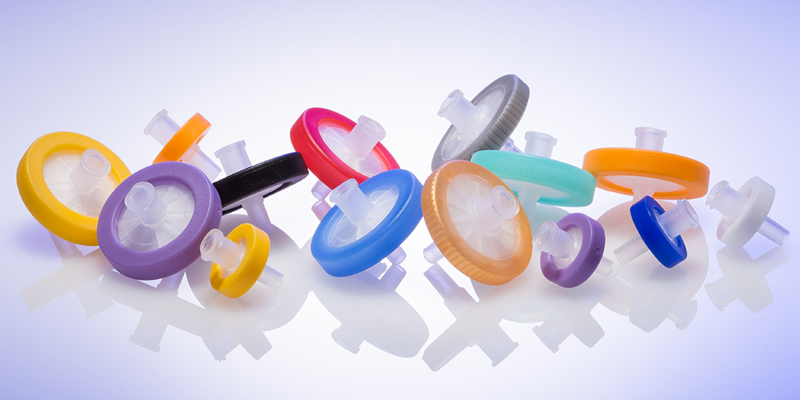Syringe Filters
Sample Preparation
Want to know more
If you want to find out more about syringe filters, please get in touch with Chromatography Direct.
Syringe filters are small filtration devices designed to remove particulate matter and impurities from liquid samples. They consist of a membrane with specific pore sizes, allowing the passage of the sample while retaining unwanted particles. As a result, syringe filters ensure sample cleanliness, protect the chromatography system from contamination, and improve column and instrument performance.
- Filtration Mechanism: Syringe filters operate on the size exclusion principle, where particles larger than the filter's pore size are retained while the filtered liquid passes through. The filter medium can be made of materials such as nylon, polypropylene, PTFE (polytetrafluoroethylene), or PVDF (polyvinylidene fluoride). The choice of filter material depends on compatibility with the solvent or sample and the desired level of chemical resistance.
- Pore Size Selection: Syringe filters are available in different pore sizes, typically ranging from 0.1 µm to 10 µm. The selection of the appropriate pore size depends on the size of the particles to be removed and the desired level of filtration. For example, smaller pore sizes are used for fine filtration, removing small particles and microorganisms, while larger pore sizes are suitable for coarse filtration, removing larger particulates.
- Compatibility and Chemical Resistance: When choosing syringe filters, it is important to consider the compatibility of the filter material with the solvent or sample being filtered. Some solvents or aggressive chemicals may require specific filter materials to ensure chemical compatibility and avoid sample contamination. Understanding the chemical resistance of different filter materials allows analysts to select the most appropriate syringe filter for their specific application.
- Sterile and Non-Sterile Filters: Syringe filters are available in sterile and non-sterile versions. Sterile filters are designed to remove microorganisms from the sample and are commonly used in applications requiring aseptic filtration, such as cell culture media preparation or pharmaceutical analysis. Non-sterile filters are suitable for general filtration purposes where removing particulates is the primary goal.
- Sample Volume and Filtration Speed: The sample volume to be filtered and the desired filtration speed are important considerations when selecting syringe filters. Filters with larger surface areas allow higher sample volumes to be processed without clogging or decreasing filtration efficiency. Additionally, filters with optimised flow rates help to expedite the filtration process, saving time without compromising filtration quality.
- Applications: Syringe filters are extensively used in various analytical and laboratory applications. They are commonly employed in sample preparation for HPLC, GC (Gas Chromatography), or LC-MS (Liquid Chromatography-Mass Spectrometry) analyses to remove particulates that may clog the instrument or interfere with the analysis. Syringe filters are also used in environmental analysis, food and beverage testing, pharmaceutical quality control, and research laboratories.
- Handling and Storage: Proper handling and storage of syringe filters are essential to maintain their performance. Filters should be stored in a clean and dry environment, protected from dust and contaminants. Disposable filters should be used once and discarded to avoid cross-contamination and ensure consistent filtration performance. Regular inspection and replacement of filters help maintain reliable filtration results.


